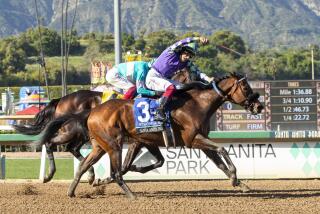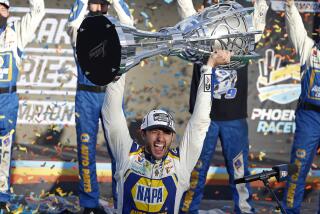Budget Crunch : Driver-Owners Such as Dave Marcis Lag Behind Rivals Who Have Big-Money Sponsorship Deals
He pulls up to the trailer in the rented compact car at Brooklyn, Mich., and unloads the groceries: two loaves of bread, some cold cuts, a bunch of bananas, five bags of ice. Itâs lunch for a crew of four, plus the assorted hangers-on who have come in from Wisconsin and Florida for the weekend to schlep tires and fill gas cans, their pay the assumed panache of being part of Dave Marcisâ Winston Cup crew.
Fifteen trailers away, Ron Miller sits in an office and plans the work of the seven caterers and their helpers who will serve Sunday brunch to 2,500 or so employees of the sponsors of Jeff Gordonâs race car and its 30-plus crew.
Marcis only hopes heâll still be at Michigan International Speedway on Sunday. It will mean he qualified for the Miller 400 and has a chance to make some money.
It always comes down to money.
âI love racing,â he says. âIâve been in it all my life, but itâs really getting tough to make ends meet. I donât know what to do. I get mixed emotions all the time with the team, whether to go on or not. Itâs tough.â
And getting tougher. The week before, his hardy band was at Pocono International Raceway in Long Pond, Pa., where Friday was spent with a slow qualifying time and practice. Saturday morning, his nearly new Chevrolet qualifying engine blew, and another was installed. All the data from Fridayâs practice was out the window, and Saturdayâs qualifying time was even slower.
Too slow to make the field, as it turned out, so the Marcis Racing Team packed up and went back to Asheville, N.C., no money in and thousands of dollars out for the third weekend this season.
âHe races everybody as hard as he can every lap,â says Richard Childress, one of NASCARâs âhavesâ as owner of the Dale Earnhardt and Mike Skinner cars, and also a Marcis benefactor. âIf he was 20 years younger, he would be a million-dollar driver.â
But Marcis is 56, and he has earned $264,214 this season, more than half of that at Daytona and Texas. Childress has helped him get a hunting apparel company as a sponsor, but itâs not Gordon or Earnhardt or Rusty Wallace money. Marcis is grateful . . . and frustrated.
âWe get by on whatever we can get,â he says. âI guess, realistically, a couple of million or $2.5 million is what I feel like we can do a super-good job on.
âI get support from Chevrolet, I get support from Goodyear and I scrape by on whatever I can get. I think the big teams are operating on, I hear, $3 million to $5 million and up. You see, the thing is I just . . . well, we have sponsorship and we donât have what we need, but I donât want to bad-mouth anybody.â
His $3 million-$5 million estimate is low. Geoff Bodine, like Marcis a driver-owner, spends $5.5 million. Childress spends $6 million on each of his cars, and others spend more.
One source says Marcis is making do with about $1.5 million with his third sponsorship in three years. Companies donât like investing money in cars that finish 32nd and sometimes donât even make the race.
He supplements his sponsorship and purse money by testing cars for Childress, because Earnhardt doesnât like to test. In return, Childress gives Marcis engines for the four restrictor-plate races, two at Daytona and two at Talladega.
He also tests tires for Goodyear and tests cars for the International Race of Champions, which brought him to the new California Speedway on Monday.
Besides the four full-time employees he had at Michigan Speedway, he has four others back at the shop, near Asheville, working on cars and trying to get ahead. That gives him eight, against the big guysâ 30-60.
Marcis figures he needs four or five more people, but he also needs the $200,000 or so to pay them and provide benefits. Marcis gets youngsters, teaches them the business and then loses them to teams that can pay more.
âI canât match their salaries,â he says. âI sometimes feel like all the extras I do . . . to help fund my operation, that itâs not appreciated. I do work to try to keep money in the operation to keep paying them. Thereâs not much loyalty.â
Every decision is based on dollars, and mistakes are costly.
He qualified fifth at Dover, Del., and the teamâs spirits soared at the prospect of a big payday. He bought seven sets of tires at $1,500 a set to run the 500-mile race, and he finished 25th, earning $19,540, because he should have bought eight.
âThatâs the difference between the little guy and the big guy,â he says. âThe big guy buys everything he needs. The little guy always says, âIf I had done this or if I had done that.â Itâs a lot of ifs.
âYou second-guess yourself. The big guy doesnât do that. If he thinks he needs 12 sets of tires, he buys 12 sets of tires. I might try and buy seven and get by with them and then think I should have bought eight.
âThe big guy just does everything the way he wants to do it, the little guy does everything the way he can afford to do it. Then, if it doesnât run, the big guy doesnât have to second-guess himself. He can say, âI did everything I could do and it didnât work.â Thatâs the advantage of having the money.â
Research and development is for the big guys. The little guys take the product of the big guysâ work and buy what they can. That means they always lag behind the successful teams.
âItâs like our engine program,â Marcis says. âIâve got a good engine guy [Jim Michael], but I need to keep him harnessed down all the time on what he can spend and what he can do R&D; on. I have to tell him, âJim, weâve got to stay with what we know works.â He says, âBut Iâm just trying to make you better, and I have to say, âI know that, but we canât afford it.â â
Marcis spends about $300,000 on engines. Bodine spends about $1.2 million and others spend more.
âThey buy it and try it,â says Marcis. âI canât do that. I research things out pretty good and make sure itâs something that will benefit us, because I canât afford to waste anything.â
It wasnât always that way. Marcis, stubbornly independent, drove for Harry Hydeâs successful team in the mid-â70s, winning four races and 13 pole positions. He has won one race for himself, in 1982. His best finish last season was 11th at Talladega. He has earned more than $5 million in prize money since 1968 and has probably spent twice that doing it.
Earnhardt won $2,285,926 last season as a return on Childressâ $6 million investment.
âIâm sure in his mind and his heart, he thinks, âToday is the day. People in front of me will have trouble and today is the day,â â Childress says of Marcis.
Says Marcis: âYou always try to win a race, but itâs damn tough. Thereâs times when you wonder if it can happen, and then thereâs times like Dover when you run good that you think it might happen. Itâs certainly a longshot right now.â
Itâs the longest kind of shot, and Marcis is beginning to realize that heâs a dinosaur, about to become extinct. Chevrolet would like him to become a car owner and have somebody else drive. Childress shares that feeling and has told his friend as much.
There is also the possibility of becoming a team manager. There have been offers, but that would mean working for somebody else, something he has seldom done since leaving a woodworking company in Wausau, Wis,. when he was 16.
âI guess it wouldnât be so hard,â he says. âIâm at my shop every day, from 8 or 8:30 and sometimes to 8 or 9 at night. If I was working for somebody else and in there at 8 in the morning and out at 5 at night, I guess it wouldnât be a problem.â
Until then, he has his independence and a serious dose of pride.
âIâve always prided myself in paying our bills and paying them promptly, and never since Iâve been in racing have I ever been in debt to people or people have to call us up for their money,â he says. âI donât have any bills. Everything that weâve got is paid for, all [nine] of our cars and our shop and the equipment in it.
âBut I guess the main deal is, I like to race. I wish I could be more competitive, but I just like to race.â
Thatâs what keeps him going out with a slingshot, a few pebbles and some bologna sandwiches, trying to slay Goliath.
More to Read
Go beyond the scoreboard
Get the latest on L.A.'s teams in the daily Sports Report newsletter.
You may occasionally receive promotional content from the Los Angeles Times.










